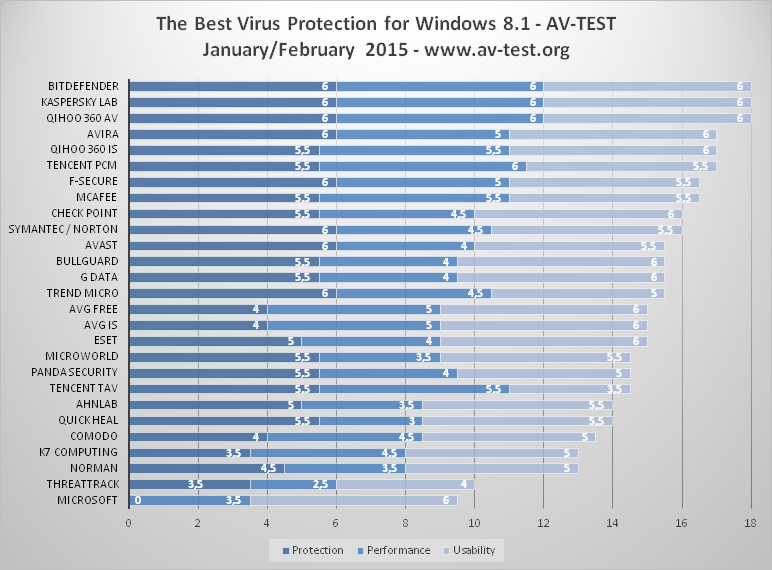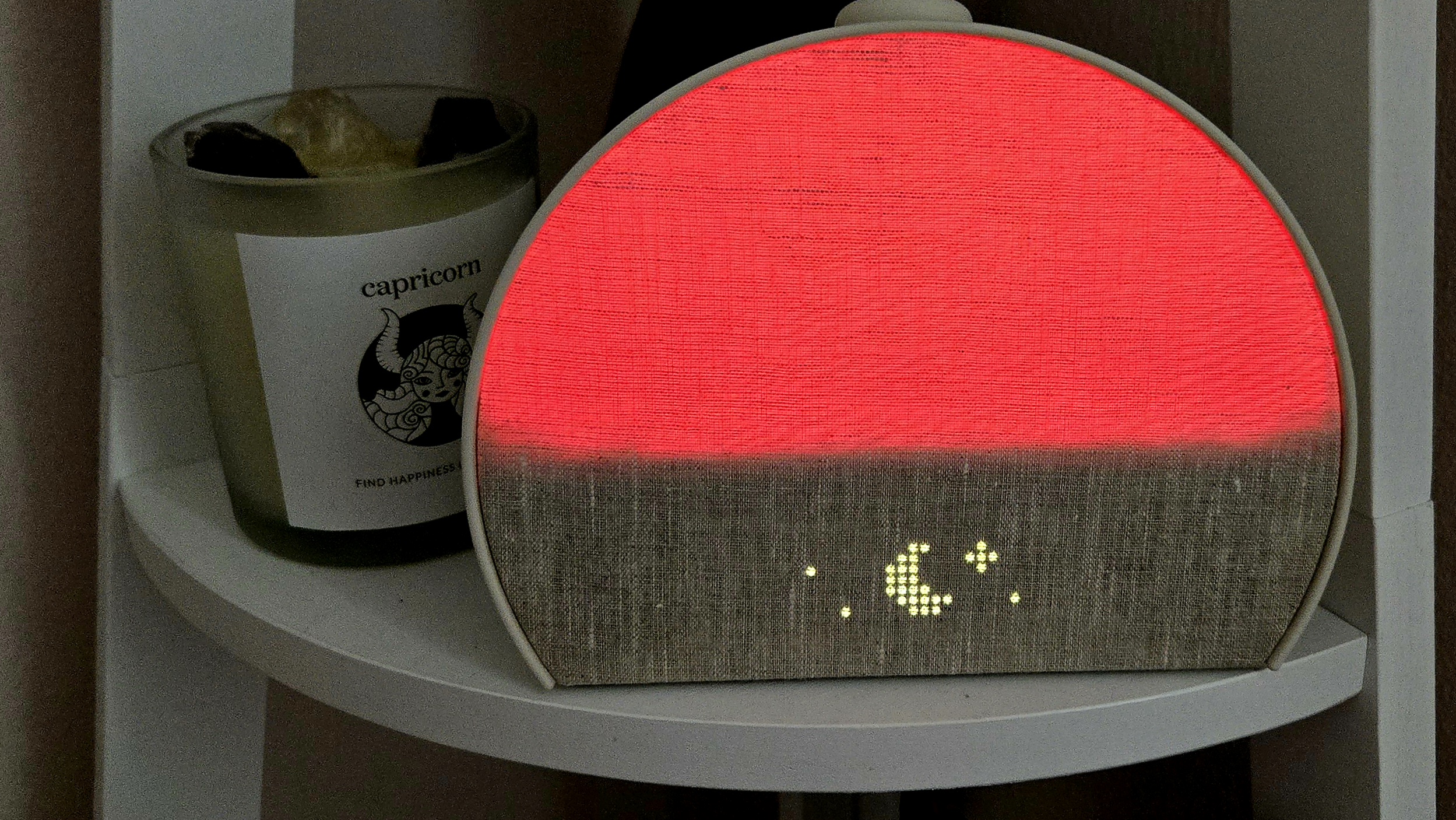Microsoft Bombs Antivirus Tests Yet Again
AV-TEST, which evaluates how well different brands of antivirus software perform, put Microsoft at the bottom of the barrel once again.


If you're using nothing but Microsoft Windows Defender to protect your PC, you may want to toss the system into a bonfire now, before it's too late for the rest of your network. It's not among the best antivirus software programs.
AV-TEST, which periodically evaluates how well different brands of antivirus software perform, put Microsoft at the bottom of the barrel once again in its latest round of evaluations. The good news, however, is that there are plenty of alternatives that work much better, and some of them are even free.
AV-TEST posted the results for its latest Windows 8.1 antivirus evaluations on its website today (March 25). The last time the company tested these products on Windows 8.1 was in October 2014 (it evaluated most of them on Windows 7 in January 2015), and while a few rankings have changed since then, Microsoft's status as the nadir stayed the same.
MORE: Best Antivirus Software and Apps
The Madgeburg, Germany-based testing lab evaluates antivirus programs on a three-tiered scale, which takes into account protection, performance and usability. A program can earn six points in each category, so a "perfect" program would score 18 overall.
Only three antivirus programs got perfect scores: Bitdefender Internet Security (currently $40 per year on the company website), Kaspersky Internet Security ($60 per year) and Qihoo 360 Antivirus (free, but available only in China).
These security suites come from Romania, Russia and China, respectively, but the first two are available around the world. Each blocked 100 percent of real-world threats tested, with clean interfaces and speedy performance.
Get instant access to breaking news, the hottest reviews, great deals and helpful tips.
With 17 points apiece, German program Avira Antivirus Pro ($50), and Chinese programs Qihoo 360 Internet Security/Total Security Essentials (free, and available outside China) and Tencent PC Manager (free, for users outside China) also gave a very respectable showing. Qihoo 360 Internet Security protected against 99 percent of real-world malware attacks, while the other two covered the full 100 percent.
Most of these brands also make software for Macs and Android devices; for more on those platforms, check out our lists of the best Mac antivirus software and the best Android antivirus apps.
Finnish program F-Secure Internet Security ($40 per year) and American program McAfee Intel Internet Security ($80 per year) came in next. They protected against 100 percent and 98 percent of threats, respectively, but did suffer slight setbacks in performance and usability.
With 16 points apiece, the last two programs in the Top 10 were American programs Check Point ZoneAlarm Extreme Security ($70 per year) and Symantec Norton Security ($50 per year), which prevented intrusion by 99 percent and 100 percent of malware, respectively. They tended to perform less efficiently than their higher-ranking peers, however.
Two other programs offered perfect malware protection, but failed to crack the Top 10 due to heavy system load or difficulty of use: American-Japanese offering Trend Micro Internet Security ($40 per year) and Czech product Avast Free Antivirus (free).
Microsoft's Windows Defender (free with Windows 8/8.1) bottomed out with only 9.5 points overall, including an ignominious "0" in the protection category. It protected against only 77 percent of incoming threats, which is admittedly better than the 69 percent rating its Windows 7 counterpart, Microsoft Security Essentials, got in January.
American program ThreatTrack VIPRE Internet Security ($50 per year) did not do very well, either, scoring only 10 points for its middling protection, substandard performance and decent usability.
One thing to know about antivirus software is that each company's line of different products will usually share one malware-detection engine. (The exceptions are the Chinese companies, which use separate engines for domestic and overseas customers.)
Thus, Avira Free Antivirus should provide just as much protection as the top-rated Avira Antivirus Pro, although the former will have fewer features. Similarly, Bitdefender Antivirus Plus ($40 per year) and Kaspersky Anti-Virus ($40 per year) should be just as safe as the normally pricier Bitdefender Internet Security and Kaspersky Internet Security.
Users should note that while Windows Defender may be wholly insufficient to protect against Internet threats, that's not really what it's there for. Microsoft provides Windows Defender not as a cutting-edge antivirus program, but as a last-ditch effort to protect users who may not be tech-savvy enough to install anything else. Even a 77 percent protection rate is considerably better than nothing.
- How to Survive a Data Breach
- Mobile Security Guide: Everything You Need to Know
- Best Cloud Backup Services
Marshall Honorof is a senior writer for Tom's Guide. Contact him at mhonorof@tomsguide.com. Follow him @marshallhonorof. Follow us @tomsguide, on Facebook and on Google+.

Marshall Honorof was a senior editor for Tom's Guide, overseeing the site's coverage of gaming hardware and software. He comes from a science writing background, having studied paleomammalogy, biological anthropology, and the history of science and technology. After hours, you can find him practicing taekwondo or doing deep dives on classic sci-fi.
-
dennisburke Why did they test Microsoft Windows Defender. I use Microsoft Security Essentials with Defender disabled. I think Security Essentials works well enough for my needs.Reply -
NivenFres In Windows 8, Defender and Security Essentials is all one package under the title Defender. Security Essentials is just for Windows 7 and earlier.Reply -
intelliclint Windows Defender and Security Essentials where merged for Windows 8.Reply
The rating system here is questionable as it is performance and usability scores which can be subjective. I have seen PCs slow down with serious performance issues due to some higher end anti-virus software. -
kawininjazx I work on PCs and do tons of scans. Most of those internet security programs slow the computer down, block local network traffic, block legit website certificates, etc. and the people are still loaded with adware and viruses. I like the Microsoft AV, I never get viruses, but then again I don't click on everything I see without reading.Reply -
Pherule Looks like Avira is best bet if you want a free antivirus. I like to have Online Armor installed alongside it for complete protection.Reply
Virus.exe can't run unless I click 'allow', no matter how sneaky it is.
You also want to run Firefox with uBlock (NOT adblock), and NoScript. -
socalboomer A: The top scorers are pay solutions. Not many free solutions.Reply
B: I've had a professional beef with AV-TEST for quite a while. Their scores do not line up with what I've found or experienced.
-
Paul Wagenseil ReplyThe top scorers are pay solutions. Not many free solutions.
AV-TEST evaluates what the AV makers submit for evaluation. So if Avira submits its paid Antivirus Pro instead of its Antivirus Free, that's what gets written up. However, as the story says, Avira Free will protect you just as well as Avira Pro. -
Paul Wagenseil ReplyI have seen PCs slow down with serious performance issues due to some higher end anti-virus software.
Norton products used to be terrible for that. They've gotten much lighter in recent years, but I still prefer Bitdefender -- which is my entirely subjective opinion. Yes, I do pay for it. -
Paul Wagenseil ReplyMost of those internet security programs slow the computer down, block local network traffic, block legit website certificates, etc. and the people are still loaded with adware and viruses.
Many of these programs don't block adware, because it's not malicious, but just annoying. To deal with adware, run Malwarebytes or CCleaner -- which are NOT AV software and shouldn't be relied upon as such.
As for viruses and other malware, maybe the people are running free AV software.
